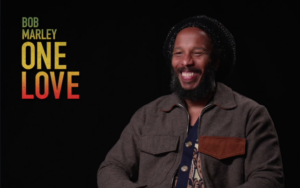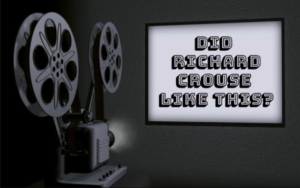CTVNEWS.CA: RICHARD INTERVIEWS ZIGGY MARLEY ON “BOB MARLEY: ONE LOVE”
 I sit down with Ziggy Marley to chat about the biopic “Bob Marley: One Love,” number one at the box office for two weeks!
I sit down with Ziggy Marley to chat about the biopic “Bob Marley: One Love,” number one at the box office for two weeks!
 I sit down with Ziggy Marley to chat about the biopic “Bob Marley: One Love,” number one at the box office for two weeks!
I sit down with Ziggy Marley to chat about the biopic “Bob Marley: One Love,” number one at the box office for two weeks!
 On the Saturday February 17, 2024 edition of The Richard Crouse Show, get to know Reinaldo Marcus Green, director of the Oscar winning film “King Richard.” He returns to theatres this weekend with “Bob Marley: One Love,” a story of how reggae icon Bob Marley overcame adversity, and the journey behind his revolutionary music. We talk about why Bob Marley’s influence still resonates today, when his life was cut short in 1981, when he was aged just 36.
On the Saturday February 17, 2024 edition of The Richard Crouse Show, get to know Reinaldo Marcus Green, director of the Oscar winning film “King Richard.” He returns to theatres this weekend with “Bob Marley: One Love,” a story of how reggae icon Bob Marley overcame adversity, and the journey behind his revolutionary music. We talk about why Bob Marley’s influence still resonates today, when his life was cut short in 1981, when he was aged just 36.
Then we’ll hear from Bob Marley’s son Ziggy Marley who talks about his father as an icon, a father and a musician.
Rik Emmett also joins me. He left Triumph in 1988 to pursue a solo career, and released records in a variety of styles, including rock, blues, jazz, classical, bluegrass, and flamenco. He’s he won the Canadian Smooth Jazz Award for Guitarist of the Year and now has written a book called “Lay It On the Line: A Backstage Pass to Rock Star Adventure, Conflict and Triumph,” available now wherever you buy fine books.
Finally, Chris Hadfield joins the show. He is an astronaut, engineer, singer, fighter pilot and author of many books, including the one we’ll talk about today, “The Defector.”
Listen to the whole thing HERE!
Here’s some info on The Richard Crouse Show!
Each week on the nationally syndicated Richard Crouse Show, Canada’s most recognized movie critic brings together some of the most interesting and opinionated people from the movies, television and music to put a fresh spin on news from the world of lifestyle and pop-culture. Tune into this show to hear in-depth interviews with actors and directors, to find out what’s going on behind the scenes of your favourite shows and movies and get a new take on current trends. Recent guests include Chris Pratt, Elvis Costello, Baz Luhrmann, Martin Freeman, David Cronenberg, Mayim Bialik, The Kids in the Hall and many more!
All iHeartRadio Canada stations are available across Canada via live stream on iHeartRadio.caand the iHeartRadio Canada app. iHeartRadio Canada stations are also connected through Alexa, Siri, and Google Home smart speakers.
Listen to the show live here:
C-FAX 1070 in Victoria
SAT 5:00 PM to 6:00 PM
SUN 10:00 AM to 11:00 AM
CJAD in Montreal
SAT 8 PM to 9:00 PM
CFRA in Ottawa
SAT 8 PM to 9:00 PM
NEWSTALK 610 CKTB in St. Catharines
Sat 8:00 PM to 9:00 PM
NEWSTALK 1010 in Toronto
SAT 8 PM to 9:00 PM
NEWSTALK 1290 CJBK
SAT 8 PM to 9:00 PM
AM 1150 in Kelowna
SAT 11 PM to Midnight
BNN BLOOMBERG RADIO 1410
SAT 8 PM to 9:00 PM
Click HERE to catch up on shows you might have missed!
 I appear on “CTV News at 11:30” with anchor Andria Case to talk about the best movies and television to watch this weekend, including “Bob Marley: One Love,” (plus my interview with Ziggy Marley!), the Prime Video series “Wolf Like Me” and the sports docuseries “The Dynasty: New England Patriots” on Apple TV+.
I appear on “CTV News at 11:30” with anchor Andria Case to talk about the best movies and television to watch this weekend, including “Bob Marley: One Love,” (plus my interview with Ziggy Marley!), the Prime Video series “Wolf Like Me” and the sports docuseries “The Dynasty: New England Patriots” on Apple TV+.
Watch the whyole thing HERE! (Starts at 18:50)
 Fast reviews for busy people! Watch as I review three movies in less time than it takes to slam the door! Have a look as I race against the clock to tell you about the music biopic “Bob Marley: One Love,” the superhero flick “Madame Web” and survival story “Land of Bad.”
Fast reviews for busy people! Watch as I review three movies in less time than it takes to slam the door! Have a look as I race against the clock to tell you about the music biopic “Bob Marley: One Love,” the superhero flick “Madame Web” and survival story “Land of Bad.”
Watch the whole thing HERE!
 I sit in with NewsTalk 1010 host Jim Richards on the coast-to-coast-to-coast late night “NewsTalk Tonight” to play the game “Did Richard Crouse Like This?” This week we talk about the music biopic “Bob Marley: One Love,” the superhero flick “Madame Web” and the survival story “Land of Bad.”
I sit in with NewsTalk 1010 host Jim Richards on the coast-to-coast-to-coast late night “NewsTalk Tonight” to play the game “Did Richard Crouse Like This?” This week we talk about the music biopic “Bob Marley: One Love,” the superhero flick “Madame Web” and the survival story “Land of Bad.”
Listen to the whole thing HERE!
 I join “CTV News Atlantic at Six” anchor Todd Battis to talk about the music biopic “Bob Marley: One Love,” the superhero flick “Madame Web” and the survival story “Land of Bad.”
I join “CTV News Atlantic at Six” anchor Todd Battis to talk about the music biopic “Bob Marley: One Love,” the superhero flick “Madame Web” and the survival story “Land of Bad.”
Watch the whole thing HERE!
 I join CP24 to have a look at the music biopic “Bob Marley: One Love,” the superhero flick “Madame Web,” the survival story “Land of Bad” and the sublime “Perfect Days.”
I join CP24 to have a look at the music biopic “Bob Marley: One Love,” the superhero flick “Madame Web,” the survival story “Land of Bad” and the sublime “Perfect Days.”
Watch the whole thing HERE!
 I join CTV NewsChannel anchor Renee Rogers to talk about the music biopic “Bob Marley: One Love” and the superhero flick “Madame Web.”
I join CTV NewsChannel anchor Renee Rogers to talk about the music biopic “Bob Marley: One Love” and the superhero flick “Madame Web.”
Watch the whole thing HERE!
 I joined CP24 Breakfast to have a look at new movies and television shows coming to theatres and streaming services. Today we talk about the music biopic “Bob Marley: One Love,” the superhero flick “Madame Web” and the Aoole TV+ historical drama “The New Look.”
I joined CP24 Breakfast to have a look at new movies and television shows coming to theatres and streaming services. Today we talk about the music biopic “Bob Marley: One Love,” the superhero flick “Madame Web” and the Aoole TV+ historical drama “The New Look.”
Watch the whole thing HERE!